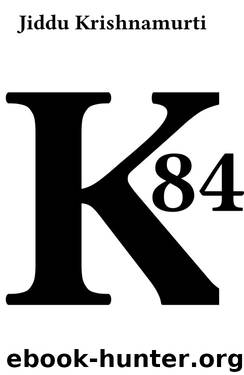Krishnamurti - 84 by Jiddu Krishnamurti

Author:Jiddu Krishnamurti [Krishnamurti, Jiddu]
Language: eng
Format: epub
Published: 0101-01-01T00:00:00+00:00
Brockwood Park
First Brain Seminar
A: Some of the unresolved questions in the area of brain research lie in perception, memory and the nature of intelligence. You, Krishnamurti, have explored these questions without any scientific background and yet have indicated that thought is limited. You have also indicated that there is an intelligence beyond the ordinary functioning of the brain. As long as there is psychological conditioning, which is the self, this intelligence cannot act.
I would like to introduce you to Dr.Shainberg, he is a psychiatrist from the United States. Dr.Peat is a physicist, writer and film maker from Canada. Professor Bergstrom is a neuro-physiologist at the University of Helsinki, Finland. Professor Varela is a neuro-biologist at the Max Planck Institute for brain research in Frankfurt. I am a neuro-biologist and teacher at Brockwood Park.
One important instrument in the understanding of the brain has been thought. I was wondering if we could discuss whether thought can help us to understand the brain, and the complexity of life.
Krishnamurti: Do I start right off?
A: If you wish.
Krishnamurti: Sir, can one understand one's own brain and the activities and the complexity of the brain without operating on animals, dead bodies and so on? Can one observe the very complex structure and nature of the brain in oneself, rather than seek it externally, outside? Is that possible? I feel it is possible if one can watch very carefully, objectively, without any bias, the reactions, the biological responses and the inward urges and temperaments and idiosyncrasies, the whole complexity of human existence.
To approach this very, very complex problem, if one has a complex mind then it is not possible to understand complexity, but if one can approach it very simply. I mean by simplicity, without compulsion, without will, without a direction, motive, just to watch the whole operation of one's own activities and so on. And then I think it is possible to examine, or to observe the activity of one's own brain without seeking it externally.
C: What do you mean by understand?
Krishnamurti: By observing, I don't mean understand. By watching very carefully the complexity of oneself. What is the operation of thought, how thought arises, what is the cause of it, the origin of thought and the activities both externally, technologically, the moment of thought and the limitation of thought.
B: When you say, is it possible to understand the brain, do you mean only thought and psychological reaction, or do you mean things like the fact that I can see the glass. Perception, do you mean, as well?
Krishnamurti: Yes, perception, surely.
B: And the use of language?
Krishnamurti: Surely. Linguistics, all that. The whole complexity of human endeavours, actions and feelings, all that, imagination, the whole content of that.
B: And learning.
Krishnamurti: Watching.
B: Watching and being able to learn something new. Being able to learn and work in a totally new situation.
Krishnamurti: Would you call it learning? What is there to learn by just watching?
E: Well that seems to me precisely where there seems to be a fundamental distinction between merely observing, not merely, observing, completely observing.
Download
This site does not store any files on its server. We only index and link to content provided by other sites. Please contact the content providers to delete copyright contents if any and email us, we'll remove relevant links or contents immediately.
The remains of the day by Kazuo Ishiguro(8981)
Tools of Titans by Timothy Ferriss(8369)
Giovanni's Room by James Baldwin(7330)
The Black Swan by Nassim Nicholas Taleb(7111)
Inner Engineering: A Yogi's Guide to Joy by Sadhguru(6785)
The Way of Zen by Alan W. Watts(6603)
Asking the Right Questions: A Guide to Critical Thinking by M. Neil Browne & Stuart M. Keeley(5762)
The Power of Now: A Guide to Spiritual Enlightenment by Eckhart Tolle(5760)
The Six Wives Of Henry VIII (WOMEN IN HISTORY) by Fraser Antonia(5505)
Astrophysics for People in a Hurry by Neil DeGrasse Tyson(5182)
Housekeeping by Marilynne Robinson(4436)
12 Rules for Life by Jordan B. Peterson(4299)
Double Down (Diary of a Wimpy Kid Book 11) by Jeff Kinney(4261)
Ikigai by Héctor García & Francesc Miralles(4247)
The Ethical Slut by Janet W. Hardy(4243)
Skin in the Game by Nassim Nicholas Taleb(4240)
The Art of Happiness by The Dalai Lama(4125)
Skin in the Game: Hidden Asymmetries in Daily Life by Nassim Nicholas Taleb(3993)
Walking by Henry David Thoreau(3953)
